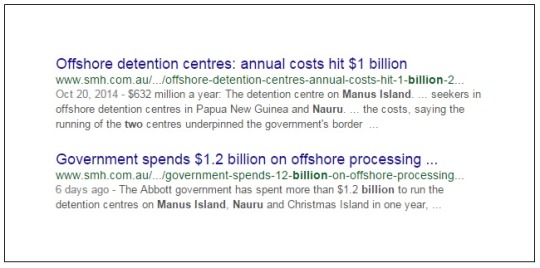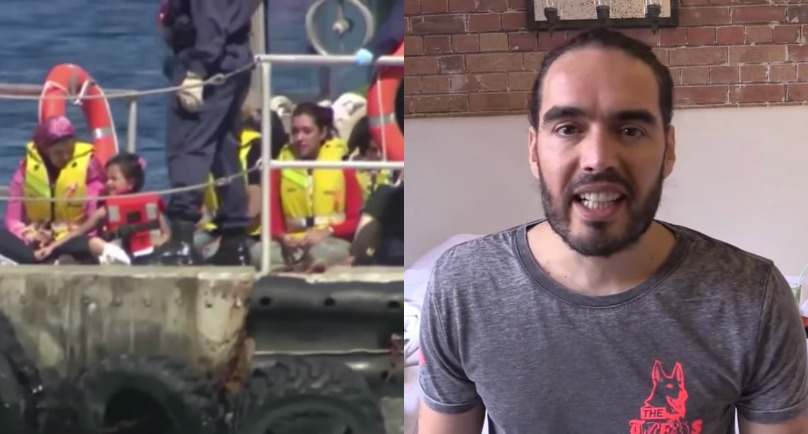by Allanah Leahy – EM TV Online
Detained refugees on Manus Island have written a letter of thanks to British actor and comedian, Russell Brand in response to a segment on his web series, The Trews.
The neatly scripted letter details several tragic incidences and circumstances, including living conditions and deaths at the processing centre.
In the segment, which aired last Thursday, Brand largely questions the Papua New Guinea-Australia government’s refugee policy, calling the idea ‘an old-fashioned one, and not in tune with our progressive, globalised times’.
Brand also condemned the media blackout at the centre – a point similarly shared by Australia’s Opposition leader, Bill Shorten, who called for more transparency on developments at the centre.
The video has received upward of 180,000 views.
The segment comes amid recent hunger strikes and protests at the Manus detention centre. The protests were quelled by PNG authorities, who reportedly arrested and jailed ‘agitators’.
The letter is addressed to Brand and although the method of delivery is unclear, a picture of the letter, obtained by The Guardian Australia, read:
“We are writing from Foxtrot Compound inside the Manus Island offshore detention centre. Thank you for remembering us. Our voices are weak and nobody with any power listens to our friends and advocates. So for you to speak about us to such a wide audience is unique and heart-warming to us. Thank you so much.”
The letter mentions the recent hunger strikes and Reza Barati, who was beaten to death in a riot early last year, as well as Hamid Kehazaei, who died from an infection in his leg.
“During the recent hunger strike protest carried out within Foxtrot compound our community leaders made every effort to keep our protest peaceful and we are achieved this goal because the officials promised us that if we remain peaceful then our compound would remain free of the threatening, forceful interventions which at the time were imminent to other compounds.”
Although there were reports of 58 refugee ‘agitators’ arrested and jailed after the protests, with another 20 held elsewhere, the letter reads:
“Fifteen of our leaders were forcefully removed and [sent to] Lorengau prison to join the other 61 men [that] have already been sent to this prison. Up until today – 9 February 2015 – none have been [returned] to our compound.”
A 2011 United National High Commissioner for Refugees (UNHCR) report states that refugees are protected under the 1951 Refugee Convention, of which the PNG and Australian governments are party to.
“The 1951 Convention protects refugees.
It defines a refugee as a person who is outside his or her country of nationality or habitual residence; has a well-founded fear of being persecuted because of his or her race, religion, nationality, membership of a particular social group of political opinion; and is unable or unwilling to avail him-or herself of the protection of that country, or to return there, for fear of persecution.
People who fulfil this definition are entitled to the rights and bound by the duties contained in the 1951 Convention.”
The refugees, who risk their lives on unreliable vessels travelling from Indonesia, Sri Lanka and other countries, have been turned away from Australia and sent to Manus Island for detainment since late November, 2012.
Amnesty International documented human rights abuses at the centre in a 2013 report and recommended calling off the Regional Resettlement Arrangement. Reports of violence, bullying, threatening and cruel living conditions have plagued media outlets, human rights organisations and international lawyers to name a few.
In a video response to the segment, Kitty Thatcher, a teacher and member of Australians and Allies Overseas Against Mandatory Detention, spoke of her experiences volunteering at detention centres between 2009-2012.
Thatcher disseminates Russell’s segment and goes into further detail on conditions and the economic disadvantages detention centres bring in comparison to the revenue and growth they provide to society and the economy.

Thatcher also shows footage of peaceful protests for Manus Island refugees in late January this year throughout the cities of New York, Dublin, Cambridge, Brussels, Berlin, Santiago and London, to name a few.
Russell Brand’s The Trews, which debuted in late February last year, centres on the dissemination of media coverage around the world. The show’s title is a play on the words ‘true’ and ‘news’.


